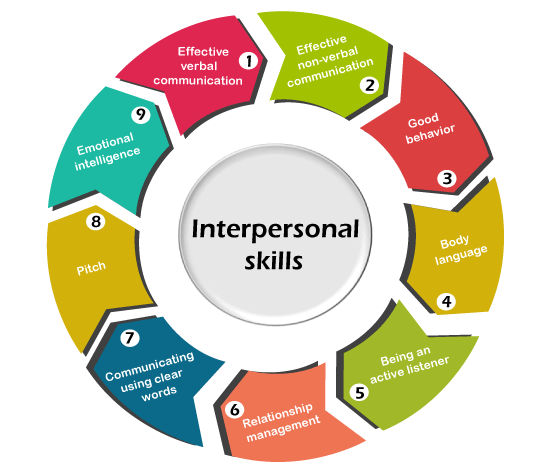
- jaro education
- 17, February 2024
- 11:00 am
In the fast-paced landscape of the modern world, the ability to connect with others on a personal and professional level has become an invaluable skill set. Soft skills, often overshadowed by technical expertise, play a pivotal role in steering individuals through the intricacies of life’s challenges. At the forefront of these soft skills is effective communication—an essential tool that transcends personal relationships, career trajectories, and negotiation tables.
In this blog, we will deep dive into various parts of interpersonal communication. With a focus on its significance in both personal and professional spheres, we will dive into the four fundamental principles that underpin successful interpersonal communication as well as different ways of communication. So, let’s get started.
What is Interpersonal Communication?
Interpersonal communication means sharing information, ideas, and feelings between two or more people using words or without speaking.
This usually happens when people talk face-to-face and use their voice, facial expressions, body language, and gestures. How good someone is at interpersonal communication is judged by how well they can get their messages across to others.
In the workplace, people often use interpersonal communication for things like talking to coworkers every day, having meetings with clients, giving feedback on how well someone is doing at work, and discussing projects over online platforms or in person.
Table of Contents
Importance of Interpersonal Skill in Management
The role of interpersonal communication in management is pivotal, playing a crucial part in effective collaboration and relationship-building within both personal and professional spheres. Possessing robust interpersonal skills enables individuals to foster strong connections with groups and individuals alike. Those adept in interpersonal communication not only excel in building positive relationships but also demonstrate proficiency in working collaboratively with colleagues, friends, family, and clients.
Furthermore, the significance of interpersonal skills extends to problem-solving and decision-making. Individuals equipped with these skills can leverage effective communication and understanding of others to arrive at optimal solutions and make well-informed decisions that benefit all parties involved.
In management, employers actively seek individuals with strong interpersonal skills due to their proven ability to function well within teams and effectively collaborate with colleagues. Moreover, individuals with exceptional interpersonal skills often emerge as successful leaders, excelling in their capacity to communicate with and motivate those around them. Some of the major benefits of interpersonal communication are as follows:
Solving Problems
Good communication skills help people talk about problems and think about different options before deciding on the best solution.
Matching Business Goals
If bosses and workers don’t communicate well, it can affect the business negatively. When managers can’t explain tasks clearly, workers can get upset and not understand the business goals. So, both managers and co-workers must understand the business goal thoroughly and then work accordingly to achieve the same.
Building Trust
67% of workers globally reported that they don’t trust their bosses. As per a recent study by the Economic Times, lack of trust leads to 60% lower productivity and 50% poor interaction. Not trusting and not being clear are common reasons for bad communication at work. Good communication skills, especially for leaders, are important to build trust and make the workplace better.
Managing Changes
When a company is making big changes, good communication is super important. Talking well with employees helps them understand the changes, get on board with them, and work together to make the changes work.
Recognizing Employees
When people communicate well with each other at work, they notice and appreciate each other’s good work. Good communication helps build positive relationships between employees and managers, leading to more recognition and helpful feedback.
One best way to learn different dynamics of management is through the Accelerated General Management Programme offered by IIM Ahmedabad which equips working professionals with a thorough understanding of general management in the global business environment. This program contains diverse aspects of business management, including contemporary and emerging topics that are essential for effective business management.

*javatpoint.com
Elements of Interpersonal Communication
After understanding the importance of interpersonal communication, let us further explore this concept by dissecting it into six fundamental elements. These components play a crucial role in addressing the question: “What is interpersonal communication?”
1. Communicating Parties
In any conversation, there’s a person sending the message and another person receiving it. Both people should take turns being the sender and the receiver.
2. The Message Itself
This part is about the information being shared. It can be spoken words or non-verbal cues like gestures and expressions.
3. Extraneous Noise
Noise is anything that messes with the message. It could be actual sounds like traffic or a crying baby. But it’s not just about physical noise; it also includes things like cultural misunderstandings, confusing jargon, or even body language that sends the wrong signals.
4. Feedback
Feedback is like an instant response to a message. It can be words like “I agree” or “I’m confused.” It can also be shown through facial expressions or changes in body language.
5. Context
“Read the room” is a saying that means paying attention to the overall mood and atmosphere. Context includes where the conversation is happening, the feelings of the people involved, and the social setting.
6. The Channel
This part is all about how the message moves from the sender to the receiver. It involves both what is seen and what is heard.
4 Principles for Effective Interpersonal Communication
These four communication principles will help you grasp the basic parts of communication and support you in improving or building essential communication skills.
Communication is Unavoidable
Communication is always happening, whether you realize it or not. When we say, “You cannot not communicate,” it means that you are always sending messages, even without speaking. Communication involves sharing information between you as the sender and someone else as the receiver. The key to good communication is making sure that you understand the message correctly.
You communicate not only with words but also through your actions, like how you dress, your facial expressions, and your body language. These nonverbal cues can be a bit tricky because different people might interpret them in different ways. Skilled communicators, pay attention to the messages they are sending.
So, it’s important to ask yourself, “What messages am I sending out? How will people understand these messages? How would I feel if I got this message?” By being aware of the messages you’re sending, you can start improving your communication skills.
Communication is Irreversible
Communication is like a one-way street – once you say something, you can’t take it back. There’s a saying, “Taste your words before you spit them out,” which means you should think about what you’re going to say. It’s important to think before speaking, especially when we’re upset or in casual situations. As a good communicator, it’s best to keep your words positive and focused on building good relationships.
Communication is Complicated
Communication is a bit complicated. Dr. Julia Wood (2014) says it’s like a system where people use symbols (like words) to talk and understand each other. Words have their regular meanings (literal) and also hidden meanings (implied). What a word means can be different for different people.
There are six identity variables that have a huge influence on communication. These are: 1) how you see yourself (self-concept) 2) how you see the other person 3) how you think the other person sees you 4) how the other person sees themselves 5) how the other person sees you and 6) how the other person thinks you see them.
So, a good communicator tries to avoid confusion and asks questions to make sure everyone understands each other. Being good at talking to people means you can adapt and communicate well in different situations.
Communication is Contextual
Communication happens in different situations, and these situations affect how we talk to others. Let’s break it down:
Psychological Context
This is about how someone is feeling, like their mood or emotions. What you’re feeling, and what the other person is feeling, can really change how you communicate. For example, some people need their morning coffee before they can really understand anything.
Relational Context
This is about how close you are to the other person. Talking to a stranger at the airport is different from talking to a good friend or your partner. We naturally change how we talk based on how close we are to someone (this is called convergent communication).
Situational Context
This is about where the communication is happening, like at the office, a local pub, or in private/public spaces.
Cultural Context
This is about the learned behaviors and norms of a particular culture. Different cultures communicate in different ways. For instance, in some cultures, making steady eye contact shows engagement and respect. But in other cultures, it might be seen as aggressive or disrespectful. So, understanding the cultural context helps make communication more effective.
Vital Interpersonal Communication Theories in Management
Various theories in interpersonal communication explore how people interact, influencing the quality of communication. Understanding these theories can enhance your communication style.
Social Penetration Theory
This theory emphasizes relationship closeness, suggesting that self-disclosure fosters effective communication. As a manager, sharing personal stories builds bonds, encouraging team members to reciprocate, fostering trust, empathy, and improved communication.
Uncertainty Reduction Theory
Communication is hindered when parties lack familiarity. Managers should recognize the impact of unfamiliarity on team communication, and manage expectations accordingly. Encouraging team members to know each other better can alleviate uncertainty and enhance communication.
Relational Dialectics Theory
This theory advocates for a balance between connection and autonomy. Managers should promote diverse viewpoints and individuality among team members. Awareness of existing relationships within the team and your own relationships is crucial, as they can significantly influence communication and overall team dynamics.
Johari Window Model
Developed by psychologists, the Johari Window Model aids in understanding interpersonal dynamics. People openly share certain aspects while concealing others. This model emphasizes that open communication enhances interpersonal relations. As a manager, utilize team-building sessions to expand ‘open’ areas and employee reviews to address blind spots, guiding team members toward positive interactions.
Westley and MacLean’s Communication Model
This model explores the influence of the environment on interpersonal and mass communication. Communication begins with reactions to the environment, affected by cultural factors and feedback loops. Managers must comprehend how the environment impacts information understanding. This model helps managers grasp diverse interpretations within their teams, considering factors like culture and feedback loops.
Becker’s Mosaic Model of Communication
Becker’s model posits individuals as both recipients and creators of messages. Personalities, views, and communications are shaped by matrices and information sources. Similar to the telephone game, messages may be distorted through various filters. Managers can counter this by maintaining clear and frequent communication. Understanding these communication models is the first step toward improving interpersonal communication, and managers should focus on nurturing specific skills within their teams.
Conclusion
Whether you’re dealing with work or personal matters, having strong communication skills is a game-changer. The main message of this blog is that it’s never too late to get better at communication skills. By improving your communication, you’re setting yourself up for success in both your professional and personal life. So, take the time to work on these skills, and you’ll likely see positive changes in how you connect with others and navigate different situations.








